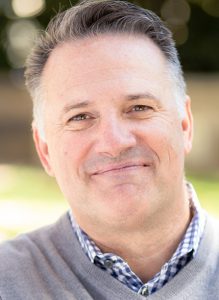Clergy become transformational leaders by experiencing the disappointment, loss and fear congregations exhibit when faced with innovative change, church coach and author Tod Bolsinger said.

Tod Bolsinger
“Leaders aren’t formed and then get called into leadership. Leaders are formed in the leading, and resilient leaders especially are formed when they’re facing the resistance,” he said during a recent webinar hosted by the Generosity Project, a collaborative venture of congregations and regions of the American Baptist Churches in the USA.
Developing the skills and intuition needed to lead change-averse congregations is often like blacksmiths forging steel, said Bolsinger, a senior professor of leadership development at Fuller Seminary. “That’s the process. It happens when you’re facing the mountain of despair — when you’re in the middle of the fire and it happens through a process of heating and holding and hammering.”
But staying the course can be daunting for ministers, especially those hired specifically to bring about the holistic transformation that later begets resentment, said Bolsinger, author of Canoeing the Mountains: Christian Leadership in Unchartered Territory and Tempered Resilience: How Leaders Are Formed in the Crucible of Change.
He also cited a concept by co-authors Ronald Heifetz and Marty Linsky that good leaders must often be willing to disappoint those they lead.
“Good leaders must often be willing to disappoint those they lead.”
“They describe leadership as disappointing your own people at a rate they can absorb,” Bolsinger said. “And this is actually a very important concept for thinking about this type of leadership because many of us became leaders because other people were disappointed in the old leaders, right?”
Transforming a church to welcome generations of people who never belonged can be challenging to those who have belonged, the former Presbyterian pastor said.
“To reach the people we love who don’t know the God we love, we’re going to have to change a church that other people have loved. They have not only loved it, they have invested in it, they supported it and they cared about it. And they basically believe it’s good enough as it is, except it’s not helping us reach the people we love who don’t know the God we love. And so, we must lead them through change.”
That may be easier said than done, especially when the well-documented sabotage phase kicks in during the planning or implementation of changes, Bolsinger continued. “Sabotage is not the bad things evil people do. Sabotage is the human things anxious people do,” he said in citing the work of Edwin H. Friedman, author of A Non-Anxious Presence: How a Changing and Complex World Will Create a Remnant of Renewed Christian Leaders.
“When people get highly anxious, there are people who want to run back to what they know. They want to go back to the familiar when asked to go do something unfamiliar, or to take the church into an unfamiliar place, or to change the church in such a way that you’ll show up on a Sunday morning and it might feel unfamiliar.”
Resulting efforts to prevent or undo change also result from feelings of disorientation or abandonment by the process, he advised. “That’s what sabotage is. It’s going back to the status quo. It’s stopping the very transformation we said we wanted, the very transformation that we might have hired you to come and do as our new pastor.”
“Sabotage is going back to the status quo.”
Bolsinger added that such undermining behavior often indicates transformation is taking hold: “Sabotage is normal. It’s natural. It’s to be expected.”
Navigating through these and other challenges related to transformation requires leaders to remain faithful on the conviction that inspired change in the first place, which Bolsinger defined as being “wholehearted.”
“Wholehearted doesn’t mean work harder. Wholehearted means coming to grips with the reality of what we’re called to do and giving ourselves over to it in a way that can be both transformative for us and for the people we’re working with.”
Viewed from that perspective, it requires leaders to undergo a reformation themselves, he said. “Leadership is energizing a community of people toward their own transformation. It’s where we become what we need to become in order to accomplish the mission God’s given us.”
Wholehearted leadership is not merely about managing a situation or process, Bolsinger added.
“Adaptive challenges require us to acknowledge we’re in a different day, that it’s not just enough to keep paddling harder, that we actually have to drop the canoes and navigate differently,” he said. “Adaptive challenges are the challenges of leadership that come up when we have no best practices, when we’re not an expert, when management won’t get us there anymore.”
Related articles:
The present crisis for church staff | Opinion by Mark Wingfield
What The Atlanta Opera and theater companies might teach the church about post-COVID adaptation
Churches must learn to adapt to ‘permanent transition,’ Leonard stresses


